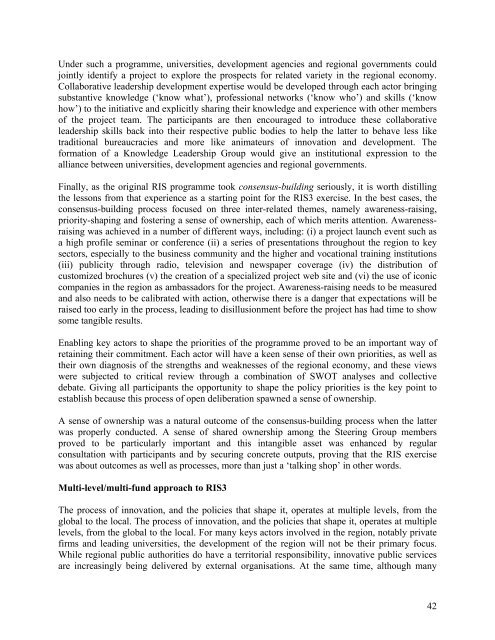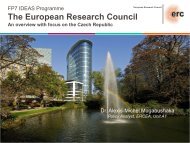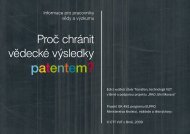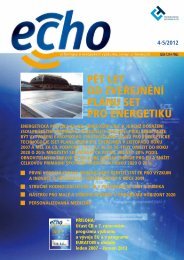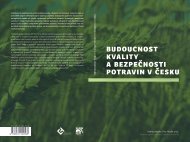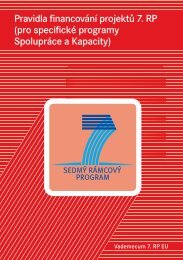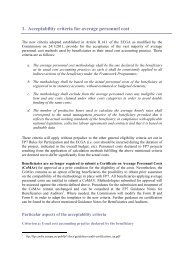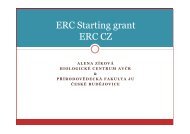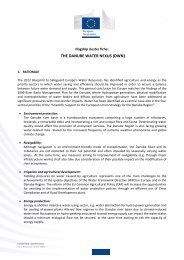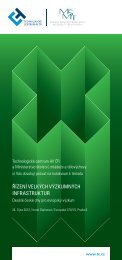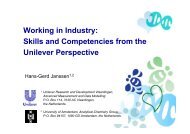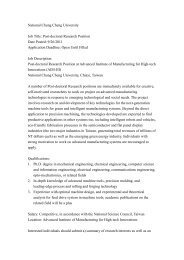Guide to Research and Innovation Strategies for Smart Specialisation
Guide to Research and Innovation Strategies for Smart Specialisation
Guide to Research and Innovation Strategies for Smart Specialisation
You also want an ePaper? Increase the reach of your titles
YUMPU automatically turns print PDFs into web optimized ePapers that Google loves.
Under such a programme, universities, development agencies <strong>and</strong> regional governments could<br />
jointly identify a project <strong>to</strong> explore the prospects <strong>for</strong> related variety in the regional economy.<br />
Collaborative leadership development expertise would be developed through each ac<strong>to</strong>r bringing<br />
substantive knowledge (‘know what’), professional networks (‘know who’) <strong>and</strong> skills (‘know<br />
how’) <strong>to</strong> the initiative <strong>and</strong> explicitly sharing their knowledge <strong>and</strong> experience with other members<br />
of the project team. The participants are then encouraged <strong>to</strong> introduce these collaborative<br />
leadership skills back in<strong>to</strong> their respective public bodies <strong>to</strong> help the latter <strong>to</strong> behave less like<br />
traditional bureaucracies <strong>and</strong> more like animateurs of innovation <strong>and</strong> development. The<br />
<strong>for</strong>mation of a Knowledge Leadership Group would give an institutional expression <strong>to</strong> the<br />
alliance between universities, development agencies <strong>and</strong> regional governments.<br />
Finally, as the original RIS programme <strong>to</strong>ok consensus-building seriously, it is worth distilling<br />
the lessons from that experience as a starting point <strong>for</strong> the RIS3 exercise. In the best cases, the<br />
consensus-building process focused on three inter-related themes, namely awareness-raising,<br />
priority-shaping <strong>and</strong> fostering a sense of ownership, each of which merits attention. Awarenessraising<br />
was achieved in a number of different ways, including: (i) a project launch event such as<br />
a high profile seminar or conference (ii) a series of presentations throughout the region <strong>to</strong> key<br />
sec<strong>to</strong>rs, especially <strong>to</strong> the business community <strong>and</strong> the higher <strong>and</strong> vocational training institutions<br />
(iii) publicity through radio, television <strong>and</strong> newspaper coverage (iv) the distribution of<br />
cus<strong>to</strong>mized brochures (v) the creation of a specialized project web site <strong>and</strong> (vi) the use of iconic<br />
companies in the region as ambassadors <strong>for</strong> the project. Awareness-raising needs <strong>to</strong> be measured<br />
<strong>and</strong> also needs <strong>to</strong> be calibrated with action, otherwise there is a danger that expectations will be<br />
raised <strong>to</strong>o early in the process, leading <strong>to</strong> disillusionment be<strong>for</strong>e the project has had time <strong>to</strong> show<br />
some tangible results.<br />
Enabling key ac<strong>to</strong>rs <strong>to</strong> shape the priorities of the programme proved <strong>to</strong> be an important way of<br />
retaining their commitment. Each ac<strong>to</strong>r will have a keen sense of their own priorities, as well as<br />
their own diagnosis of the strengths <strong>and</strong> weaknesses of the regional economy, <strong>and</strong> these views<br />
were subjected <strong>to</strong> critical review through a combination of SWOT analyses <strong>and</strong> collective<br />
debate. Giving all participants the opportunity <strong>to</strong> shape the policy priorities is the key point <strong>to</strong><br />
establish because this process of open deliberation spawned a sense of ownership.<br />
A sense of ownership was a natural outcome of the consensus-building process when the latter<br />
was properly conducted. A sense of shared ownership among the Steering Group members<br />
proved <strong>to</strong> be particularly important <strong>and</strong> this intangible asset was enhanced by regular<br />
consultation with participants <strong>and</strong> by securing concrete outputs, proving that the RIS exercise<br />
was about outcomes as well as processes, more than just a ‘talking shop’ in other words.<br />
Multi-level/multi-fund approach <strong>to</strong> RIS3<br />
The process of innovation, <strong>and</strong> the policies that shape it, operates at multiple levels, from the<br />
global <strong>to</strong> the local. The process of innovation, <strong>and</strong> the policies that shape it, operates at multiple<br />
levels, from the global <strong>to</strong> the local. For many keys ac<strong>to</strong>rs involved in the region, notably private<br />
firms <strong>and</strong> leading universities, the development of the region will not be their primary focus.<br />
While regional public authorities do have a terri<strong>to</strong>rial responsibility, innovative public services<br />
are increasingly being delivered by external organisations. At the same time, although many<br />
42


